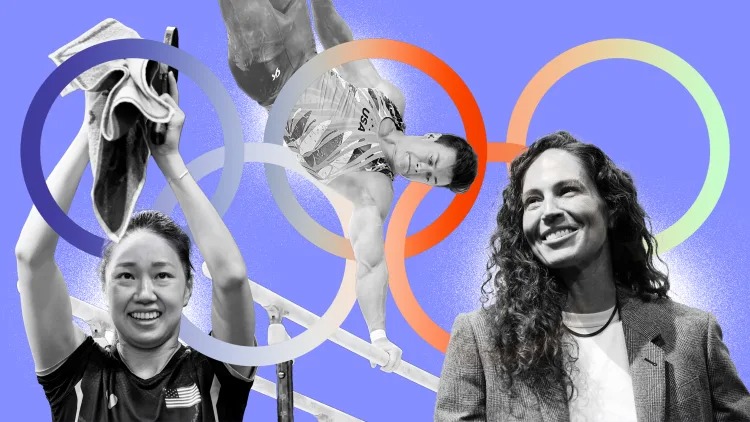- | 8:00 am
3 ways the Paris Olympians are showing us how to be emotionally intelligent
We all know these elite athletes excel in sport. They also display qualities we should aspire to in the workplace.

Hello and welcome to Modern CEO! I’m Stephanie Mehta, CEO and chief content officer of Mansueto Ventures. Each week this newsletter explores inclusive approaches to leadership drawn from conversations with executives and entrepreneurs, and from the pages of Inc. and Fast Company. If you received this newsletter from a friend, you can sign up to get it yourself every Monday morning.
Even casual watchers of the Paris Olympics can appreciate the competitors’ athleticism. Those who’ve followed the stories of U.S. gymnast Simone Biles and countless other Olympians know the role that mental wellness plays in their success. What’s become increasingly apparent to me is the way some Olympic athletes are models of emotional intelligence.
Emotional intelligence, sometimes also known as an emotional quotient or EQ, is that potent mix of self-awareness, self-regulation, motivation, empathy, and social skills that allows people to manage their own emotions and connect with others. EQ has become a staple of management literature and consulting, with plenty of articles offering advice on what emotional intelligence looks like in the workplace, and how leaders can hone their EQ skills.
But leaders need look no further than the current summer and previous Olympic Games to see how some of the world’s best athletes–especially those on teams–exhibit emotional health and well-being. Here are three of my favorite examples:
High performers can be confident and empathetic
In this delightful New York Times article, table tennis players in Paris explained how common it is for casual “ping pong” players to think they can best the Olympians.“You’ll meet someone, and their first reaction is, ‘I bet I can beat you, let’s play,’” Lily Zhang of the U.S. team told the Times. “I don’t think you’d really say that to anyone in another sport. If you saw Michael Phelps, I don’t think you’d say, ‘I bet I can beat you in a race.’”
Rather than being insulted, the players in the article shrug off strangers’ boasts–a great example of managing one’s feelings or reactions. And Zhang was empathetic, suggesting that the prevalence of tables in suburban rec rooms and community centers may explain the wannabes’ misplaced confidence. Ultimately, Zhang’s confident play spoke volumes: She made it to the round of 16 in the women’s singles before losing to South Korea’s Shin Yu-bin.
Fierce competitors know when to ignore the competition
While competing in the men’s gymnastics team competition, Paul Juda, Frederick Richard, Asher Hong, Stephen Nedoroscik, and Brody Malone could sometimes be seen in a group huddle. During an appearance on the TODAY show after winning bronze in the event, Malone explained what was going on. “After every event we did a huddle to remind ourselves to stay in our bubble,” he told TODAY. “We made it a big point to not watch any of the other teams, to just focus on what we could control, which is our gymnastics.”
According to Inc. columnist and EQ expert Justin Bariso, avoiding comparisons to others is a key component of emotional intelligence. Bariso recently highlighted a similar show of self-awareness from Simone Biles. “Rather than compare herself with others, or even with a past version of herself, Biles is focused on being the best she can be, in the moment,” he writes. It is an approach that is paying off: Biles and her teammates earned a gold in the women’s gymnastics team competition, and as Modern CEO was set to publish, Biles also won a gold medal in the artistic all-around individual final.
Disappointment can be a good motivator
Former pro point guard Sue Bird, who helped the U.S. women’s team win gold medals in 2004, 2008, 2012, and 2016, is one of the winningest players in American basketball. However, she has faced her fair share of disappointment off the court. Bird told Fast Company’s Jeff Beer that despite her superstar status, she often saw major brands shy away from partnerships with female athletes or women’s sports. “To be dramatic about it, pick a major male athlete–LeBron James or Tom Brady–when they walk in the room, people are already saying, ‘Yup!’” Bird told Beer. “For women and female athletes, there’s always this moment of, ‘Ahhh, would it sell? Ahhh, do people want to see this?’ There’s always this hesitancy.”
Bird, eager to see change, teamed up with media veteran Jessica Robertson and fellow athletes Alex Morgan, Chloe Kim, and Simone Manuel to launch Togethxr, a media and commerce company dedicated to highlighting women’s sports. Bird and others are starting to see results. Ally Financial has pledged to allot its advertising dollars equally to men’s and women’s sports. Another major landmark for women athletes: the Paris Olympic competition is approaching gender parity.
Your winning lessons from the Olympics
Are you watching the Olympic games? What emotionally intelligent moments have you observed? Send your favorite clips and quotes–and why you think they show EQ–to me at st************@******to.com. I’d love to do a roundup of the best examples of empathy, self-awareness, self-regulation, motivation, and social skills.
Read and watch more: Olympic feats
- How Olympians master their minds to perform under pressure
- A former Olympian writes about how the games shaped his leadership style
- Skier Lindsey Vonn’s strategies for overcoming challenges







































